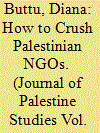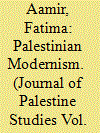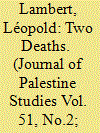|
|
|
Sort Order |
|
|
|
Items / Page
|
|
|
|
|
|
|
| Srl | Item |
| 1 |
ID:
188237


|
|
|
|
|
| Summary/Abstract |
Israel has long sought to erase Palestinians, Palestinian resistance, and Palestinian organizations. In Israel’s latest rendition of erasure, Palestinian nongovernmental organizations (NGOs) have become the new target. By labeling NGO staff, and now NGOs, as “terror-affiliated,” Israel is attempting to silence these organizations by making it impossible for them to be funded. Looking at the case of Mohammed El Halabi from World Vision, one can see that it does not take much for donors to run scared: just using the “t” word is sufficient, with no need for evidence.
|
|
|
|
|
|
|
|
|
|
|
|
|
|
|
|
| 2 |
ID:
188234


|
|
|
|
|
| Summary/Abstract |
In this article, coeditor Sherene Seikaly examines the Journal of Palestine Studies’ first two decades as the premier English-language academic publication on the Palestinian question and what was once referred to as the Arab-Israeli conflict. Using the keyword “war” in article titles as a prism for a granular analysis of the knowledge produced in the Journal, Seikaly traces some of the trends that undergirded JPS’s evolution—its prescriptive, programmatic, and prognosticating approach that was deeply imbricated in the patriarchal paradigms of international relations and political science (Revolution with a capital “R,” the “great men” of history, the imperative to make one’s case before the colonizer), but also a capacious space to view the contested terrain of knowledge production. A close reading of seventeen articles and one interview over the arc of twenty years illuminates the Journal’s pivotal role as a repository of primary and secondary literature and as an archive of Palestine and the Palestinians.
|
|
|
|
|
|
|
|
|
|
|
|
|
|
|
|
| 3 |
ID:
188235


|
|
|
|
|
| Summary/Abstract |
This article explores both the collapse of Palestinian futurity and practices of alternative meaning making in Adania Shibli’s novel Minor Detail. Through her unique negotiation with Palestinian literary modernism, including her defamiliarizing engagement of realist aesthetics within the text, as well as the defining role she assigns Israeli settler colonialism in producing modernist alienation, Shibli troubles historical truth and avoids the close-ended museumification of events. Despite the collapse of Palestinian futurity within the text, Shibli’s literary experimentation creates gaps not only in the totalizing nature of Israeli occupation, but also in its historical hegemony, reflecting the practice of what Ariella Azoulay terms “potential history.” While Shibli’s stuttering and irrational Palestinian narrator, as well as the ambiguous nature of her narrative form, might not reflect straightforward resistance to settler-colonial totality, they unsettle historical narrative from within and open up new ways to consider truth and meaning.
|
|
|
|
|
|
|
|
|
|
|
|
|
|
|
|
| 4 |
ID:
188236


|
|
|
|
|
| Summary/Abstract |
This article discusses the challenges that the settlement process poses to Israeli property regimes, examining the ways that public apparatuses, specifically those related to urban planning, are creatively mobilized to address and mitigate such challenges. The article focuses on two case studies: the Palestinian village of Kamanneh in the Upper Galilee and the Ganey Aviv neighborhood of Lydda, one of Israel’s so-called mixed cities. Based on these case studies, the paper argues that the planning process’s technical and legal manipulations as well as the raw political power involved produce and reproduce the settler-colonial logic of ownership in land as a territorial and symbolic mechanism of control.
|
|
|
|
|
|
|
|
|
|
|
|
|
|
|
|
| 5 |
ID:
188238


|
|
|
|
|
| Summary/Abstract |
In this essay, architect-activist and Funambulist editor-in-chief Léopold Lambert reflects on the ways that the architectural profession can be, and historically has been, complicit in structural injustice. He ties together the seemingly unrelated deaths of two men, uncovering in the process how architecture consecrates, amplifies, or abets oppression, be it in the settler-colonial context of occupied Palestine, in the French criminal justice system, or in the historical framework of the transatlantic slave trade.
|
|
|
|
|
|
|
|
|
|
|
|
|
|
|
|
|
|
|
|
|